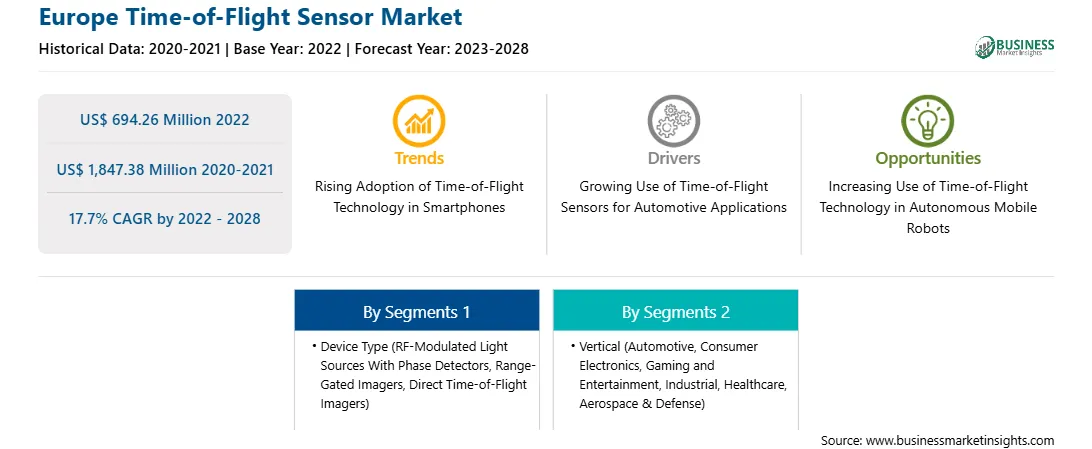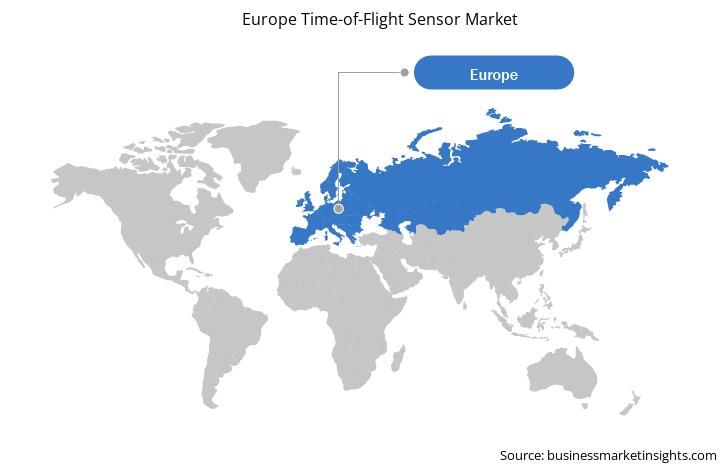Growing Use of Time-of-Flight Sensors for Automotive Applications in Europe Time-of-Flight Sensor Market
The automotive industry is improving rapidly with rising technological developments. Vehicles rely on effective sensing to allow automated systems to assist drivers and provide improved safety, comfort, and convenience. Time-of-Flight (ToF) sensors are used in autonomous vehicles for various purposes, such as localization, obstacle detection, and picking or placing objects. The technology helps detect objects and provides information on their position and movements within the three-dimensional space. It also assists in identifying the object by detecting its size, shape, and orientation. Inside the car, ToF technology is used to monitor the driver's behavior that can significantly contribute to road safety. Most accidents across the region are occurred due to the issue caused by driver's fatigue. The iToF technology helps monitor the behavior of driver and accordingly suggests or enforces break, thus potentially avoiding accidents. The sensors help detect the passengers' size and weight, which can assist in airbag deployment when necessary. Also, in the absence of passengers, the sensors will prevent unnecessary airbag deployment. Furthermore, along with the improvements in vehicle safety, the ToF technology provides comfort and convenience inside the car cabin, which may benefit drivers and passengers. The seats can be moved, and seat belts can be brought closer when the passenger gets into the car. It can also help the driver or passenger by turning on the light of the storage compartments when a hand reaches in that direction. Thus, the growing use of ToF sensors for automotive application is boosting the growth of the Europe Time-of-Flight Sensor market.
Europe Time-Of-Flight Sensor Market Overview
The Europe Time-of-Flight Sensor market is segmented into Germany, France, Spain, the UK, Italy, and the Rest of Europe. The growing automotive sector is driving the market growth in the region. It is one of Europe’s biggest sectors, representing over 7% of the region’s GDP. The presence of established car manufacturers and an increase in the development and sales of electric vehicles will boost the demand for Time-of-Flight Sensors in the coming years. Also, the government of the region is taking various initiatives for the growth of the automotive industry, which will propel the demand for Time-of-Flight Sensors. In 2020, the UK government awarded US$ 57.87 million for various low-carbon automotive projects, including electric vehicle manufacturing. Since 2006 in Europe, NATO (North Atlantic Treaty Organization) defense ministers announced annual spending of 2% of GDP on their military budgets. As a result, the demand for military and defense equipment has increased. Furthermore, in March 2022, Poland passed a law to increase defense spending to 3% of GDP. Also, in February 2022, German Chancellor Olaf Scholz announced a US$ 112.69 billion (€100 billion) injection in defense spending. Thus, the increasing defense spending by the European government will raise the demand for military and defense equipment, which will fuel the Time-of-Flight Sensor market growth in the coming years.
Strategic insights for the Europe Time-of-Flight Sensor provides data-driven analysis of the industry landscape, including current trends, key players, and regional nuances. These insights offer actionable recommendations, enabling readers to differentiate themselves from competitors by identifying untapped segments or developing unique value propositions. Leveraging data analytics, these insights help industry players anticipate the market shifts, whether investors, manufacturers, or other stakeholders. A future-oriented perspective is essential, helping stakeholders anticipate market shifts and position themselves for long-term success in this dynamic region. Ultimately, effective strategic insights empower readers to make informed decisions that drive profitability and achieve their business objectives within the market. The geographic scope of the Europe Time-of-Flight Sensor refers to the specific areas in which a business operates and competes. Understanding local distinctions, such as diverse consumer preferences (e.g., demand for specific plug types or battery backup durations), varying economic conditions, and regulatory environments, is crucial for tailoring strategies to specific markets. Businesses can expand their reach by identifying underserved areas or adapting their offerings to meet local demands. A clear market focus allows for more effective resource allocation, targeted marketing campaigns, and better positioning against local competitors, ultimately driving growth in those targeted areas.Europe Time-of-Flight Sensor Strategic Insights

Europe Time-of-Flight Sensor Report Scope
Report Attribute
Details
Market size in 2022
US$ 694.26 Million
Market Size by 2028
US$ 1,847.38 Million
Global CAGR (2022 - 2028)
17.7%
Historical Data
2020-2021
Forecast period
2023-2028
Segments Covered
By Device Type
By Vertical
Regions and Countries Covered
Europe
Market leaders and key company profiles
Europe Time-of-Flight Sensor Regional Insights

Europe Time-Of-Flight Sensor market Segmentation
The Europe Time-Of-Flight Sensor market is segmented on the basis of device type, vertical, and country. Based on device type, the Europe time-of-flight sensor market is segmented into RF-modulated light sources with phase detectors, range-gated imagers, and direct time-of-flight imagers. The range-gated imagers segment registered the largest market share in 2022.
Based on vertical, the Europe time-of-flight sensor market is segmented into automotive, consumer electronics, gaming and entertainment, industrial, healthcare, aerospace and defense, and others. The consumer electronics segment registered a larger market share in 2022.
Based on country, the Europe time-of-flight sensor market is segmented into France, Germany, UK, Italy, Russia, and the Rest of Europe. Germany dominated the market share in 2022.
Analog Devices Inc, Infineon Technologies AG, InvenSense Inc, Keyence Corp, OMRON Corp, Panasonic Holdings Corp, Sony Group Corp, STMicroelectronics NV, Teledyne e2v (Overseas) Holdings Ltd, and Texas Instruments Inc are the leading companies operating in the Europe time-of-flight sensor market.
The Europe Time-of-Flight Sensor Market is valued at US$ 694.26 Million in 2022, it is projected to reach US$ 1,847.38 Million by 2028.
As per our report Europe Time-of-Flight Sensor Market, the market size is valued at US$ 694.26 Million in 2022, projecting it to reach US$ 1,847.38 Million by 2028. This translates to a CAGR of approximately 17.7% during the forecast period.
The Europe Time-of-Flight Sensor Market report typically cover these key segments-
The historic period, base year, and forecast period can vary slightly depending on the specific market research report. However, for the Europe Time-of-Flight Sensor Market report:
The Europe Time-of-Flight Sensor Market is populated by several key players, each contributing to its growth and innovation. Some of the major players include:
The Europe Time-of-Flight Sensor Market report is valuable for diverse stakeholders, including:
Essentially, anyone involved in or considering involvement in the Europe Time-of-Flight Sensor Market value chain can benefit from the information contained in a comprehensive market report.